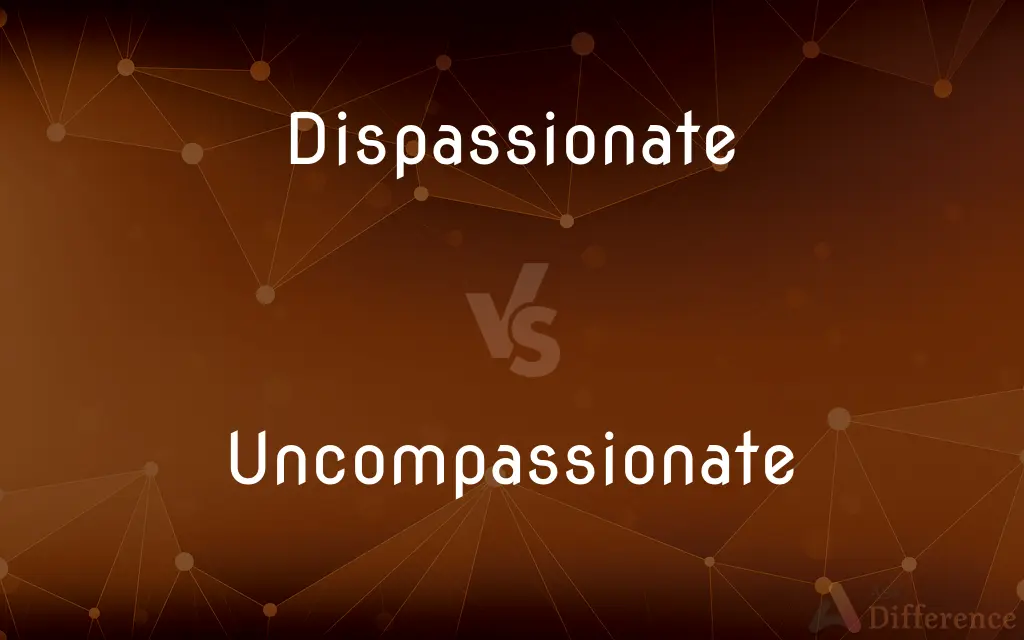Dispassionate vs. Uncompassionate — What's the Difference?
Edited by Tayyaba Rehman — By Fiza Rafique — Updated on April 27, 2024
Dispassionate refers to a lack of emotional influence in judgment, while uncompassionate denotes a lack of sympathy or concern for others.

Difference Between Dispassionate and Uncompassionate
Table of Contents
ADVERTISEMENT
Key Differences
Dispassionate decision-making is characterized by impartiality and objectivity, focusing solely on factual evidence. Whereas uncompassionate behavior exhibits a disregard for the emotional or physical well-being of others, showing little empathy.
In a professional setting, a dispassionate approach is often valued for its ability to deliver unbiased conclusions. On the other hand, being uncompassionate in such environments can lead to poor morale and a lack of support among team members.
During debates or discussions, a dispassionate individual remains emotionally detached, ensuring that arguments are based on logic and reason. In contrast, an uncompassionate person may ignore the emotional or personal circumstances of others, potentially leading to conflict.
In crisis situations, dispassionate leaders are praised for their calm and collected decision-making. Conversely, uncompassionate leaders may be criticized for their insensitivity and failure to acknowledge the distress of those affected.
In the context of caregiving, dispassionate behavior might manifest as clinical efficiency without personal bias, whereas uncompassionate caregivers may neglect the emotional needs of those they are supposed to help.
ADVERTISEMENT
Comparison Chart
Definition
Free from or unaffected by emotions
Lacking pity or sympathy
Focus in Usage
Decision-making, judgment
Attitude towards others' suffering
Connotation
Often positive (impartial, unbiased)
Generally negative (uncaring, cold)
Typical Contexts
Professional, analytical discussions
Personal interactions, caregiving
Emotional Involvement
Low, aiming for objectivity
Low, showing indifference to others
Compare with Definitions
Dispassionate
Objective.
She maintained a dispassionate tone throughout the negotiation.
Uncompassionate
Indifferent to suffering.
The leader's uncompassionate decisions affected many.
Dispassionate
Detached.
The scientist observed the experiment with dispassionate interest.
Uncompassionate
Lacking sympathy.
His uncompassionate response to the crisis was criticized.
Dispassionate
Impartial.
His dispassionate analysis proved crucial to the debate.
Uncompassionate
Hard-hearted.
Her uncompassionate demeanor made her unpopular.
Dispassionate
Free from emotion.
The judge was dispassionate in her ruling.
Uncompassionate
Unsparing.
The boss was uncompassionate about the team's workload.
Dispassionate
Unbiased.
Dispassionate reviews are essential for fair journalism.
Uncompassionate
Cold.
The supervisor’s uncompassionate attitude demoralized the staff.
Dispassionate
Not influenced by strong emotion, and so able to be rational and impartial
She dealt with life's disasters in a calm, dispassionate way
Uncompassionate
Not showing compassion or sympathy for other people
A tough, uncompassionate person
Dispassionate
Not influenced by strong feelings or emotions; impartial
A dispassionate reporter.
Uncompassionate
Not compassionate.
Dispassionate
Not showing, and not affected by, emotion, bias, or prejudice
Uncompassionate
Lacking compassion or feeling for others;
Nor silver-shedding tears could penetrate her uncompassionate sire
Dispassionate
Free from passion; not warped, prejudiced, swerved, or carried away by passion or feeling; judicial; calm; composed.
Wise and dispassionate men.
Dispassionate
Not dictated by passion; not proceeding from temper or bias; impartial; as, dispassionate proceedings; a dispassionate view.
Dispassionate
Unaffected by strong emotion or prejudice;
A journalist should be a dispassionate reporter of fact
Common Curiosities
How does an uncompassionate person behave?
An uncompassionate person shows little or no concern for the feelings or troubles of others.
Can someone be both dispassionate and compassionate?
Yes, someone can be dispassionate in their judgment while still being compassionate towards others.
Does being uncompassionate affect relationships?
Yes, uncompassionate behavior can negatively impact relationships, as it often leads to a lack of empathy and understanding, which are crucial for strong, supportive relationships.
Is being uncompassionate always negative?
Generally, yes, as it implies a lack of empathy and concern, which are considered negative traits.
What might lead someone to behave in an uncompassionate manner?
Factors such as personal beliefs, past experiences, cultural influences, or a lack of emotional awareness can contribute to uncompassionate behavior.
What does it mean to be dispassionate?
Being dispassionate means remaining impartial and not influenced by emotions.
Why is being dispassionate important in certain professions?
In professions like law or medicine, being dispassionate helps ensure decisions are fair and based on objective criteria.
What are the benefits of being dispassionate in decision-making?
Being dispassionate helps in making decisions that are rational, fair, and unbiased, which is particularly important in high-stakes or professional scenarios.
Is uncompassionate behavior the same as being cruel?
Uncompassionate behavior involves a lack of empathy and concern but isn't necessarily cruel. However, persistent uncompassionate behavior can sometimes lead to or be perceived as cruelty.
How is dispassionate behavior beneficial in emergencies?
In emergencies, dispassionate behavior can be beneficial as it allows individuals to make quick, rational decisions without being overwhelmed by emotions, potentially saving lives or stabilizing situations.
Can a dispassionate approach be perceived negatively?
While being dispassionate is often valuable for impartiality, it can sometimes be viewed as cold or uncaring if not balanced with appropriate emotional responses.
How can one develop a more dispassionate approach to situations?
Developing a dispassionate approach can involve practicing mindfulness, focusing on factual information, and learning to detach personal feelings from professional or critical decision-making.
What professions particularly value dispassionate traits?
Professions such as judges, scientists, and emergency responders often value dispassionate traits because these roles require objective analysis and decision-making free from emotional bias.
Can dispassionate and uncompassionate traits coexist in the same person?
Yes, a person can exhibit both traits depending on the situation; they may be dispassionate (impartial) in their professional life while being uncompassionate (lacking empathy) in personal dealings.
How can someone correct uncompassionate behavior?
Correcting uncompassionate behavior can involve self-reflection, empathy training, seeking feedback from others, and consciously making an effort to understand and care about the feelings and well-being of others.
Share Your Discovery

Previous Comparison
Daisy vs. Gerbera
Next Comparison
Exalt vs. ExultAuthor Spotlight
Written by
Fiza RafiqueFiza Rafique is a skilled content writer at AskDifference.com, where she meticulously refines and enhances written pieces. Drawing from her vast editorial expertise, Fiza ensures clarity, accuracy, and precision in every article. Passionate about language, she continually seeks to elevate the quality of content for readers worldwide.
Edited by
Tayyaba RehmanTayyaba Rehman is a distinguished writer, currently serving as a primary contributor to askdifference.com. As a researcher in semantics and etymology, Tayyaba's passion for the complexity of languages and their distinctions has found a perfect home on the platform. Tayyaba delves into the intricacies of language, distinguishing between commonly confused words and phrases, thereby providing clarity for readers worldwide.














































